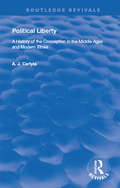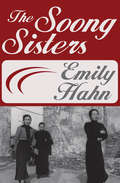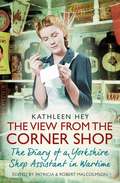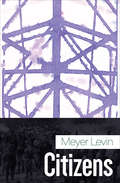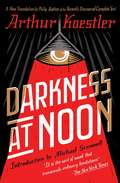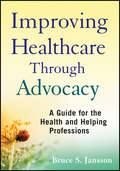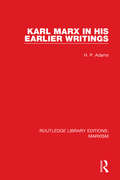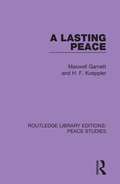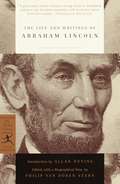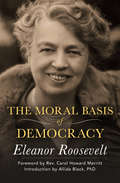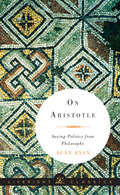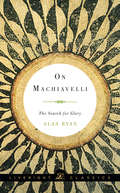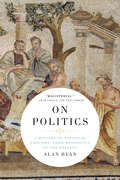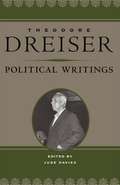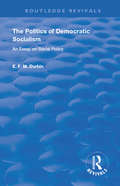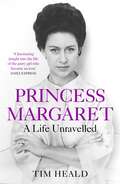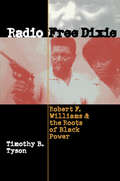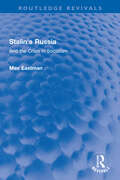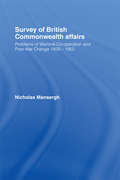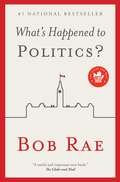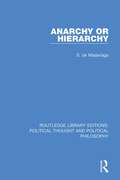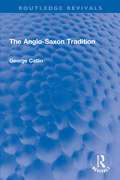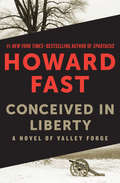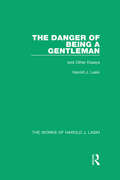- Table View
- List View
Political Liberty: A History of the Conception in the Middle Ages and Modern Times (Routledge Revivals)
by A. J. CarlyleOriginally published in 1988, this book explores the history of political liberty. There is an opinion that the conception of Political Liberty, however important it may have been in Athens and Republican Rome, disappeared in the period of the Roman Empire and in the Middle Ages, and has only been recovered in the last two centuries. This work is primarily an attempt to set out the continuity of the development of the conception of Political Liberty during the Middle Ages and the seventeenth and eighteenth centuries - the development, but even more, the continuity of development, for this has been inadequately appreciated in the past.
The Soong Sisters
by Emily Hahn&“If the story of the Soong family were told as fiction, people would say it was fascinating but too improbable. . . . A dramatic human chronicle . . . engrossing.&” —The New York Times Book Review In the early twentieth century, few women in China were to prove so important to the rise of Chinese nationalism and liberation from tradition as the three extraordinary Soong sisters—Eling, Chingling and Mayling—who would each marry historic figures. Told with wit and verve by New Yorker correspondent Emily Hahn, a remarkable woman in her own right, the biography of the Soong sisters reveals the story of China through both World Wars. It also chronicles the changes to Shanghai as they relate to a very eccentric family that had the courage to speak out against the ruling regime. Greatly influencing the history of modern China, they interacted with their government and military to protect the lives of those who could not be heard, and appealed to the West to support China during the Japanese invasion. &“[A] first-rate reportorial job on three distinguished women.&” —Kirkus Reviews &“A spirited, well-informed book . . . a fascinating saga . . . Hahn skillfully interweaves the personal material which she has collected in abundance with some indispensable background knowledge of Chinese history.&” —The Atlantic
The View From the Corner Shop: The Diary of a Yorkshire Shop Assistant in Wartime
by Kathleen HeyKathleen Hey spent the war years helping her sister and brother-in-law run a grocery shop in the Yorkshire town of Dewsbury. From July 1941 to July 1946 she kept a diary for the Mass-Observation project, recording the thoughts and concerns of the people who used the shop. What makes Kathleen's account such a vivid and compelling read is the immediacy of her writing. People were pulling together on the surface ('Bert has painted the V-sign on the shop door…', she writes) but there are plenty of tensions underneath. The shortage of food and the extreme difficulty of obtaining it is a constant thread, which dominates conversation in the town, more so even than the danger of bombardment and the war itself. Sometimes events take a comic turn. A lack of onions provokes outrage among her customers, and Kathleen writes, 'I believe they think we have secret onion orgies at night and use them all up. ' The Brooke Bond tea rep complains that tea need not be rationed at all if supply ships were not filled with 'useless goods' such as Corn Flakes, and there is a long-running saga about the non-arrival of Smedley's peas. Among the chorus of voices she brings us, Kathleen herself shines through as a strong and engaging woman who refuses to give in to doubts or misery and who maintains her keen sense of humour even under the most trying conditions. A vibrant addition to our records of the Second World War, the power of her diary lies in its juxtaposition of the everyday and the extraordinary, the homely and the universal, small town life and the wartime upheavals of a nation.
Citizens
by Meyer LevinThis 1940 novel of the labor movement offers an unflinching portrait of a Chicago steel strike: “A fine American novel—one of the best I ever read” (Ernest Hemingway).For Chicago physician Mitch Wilner, July 4, 1937, began as a typical holiday—a leisurely afternoon at the beach with his wife and young children. But when a peaceful protest erupts in violence, and Mitch sees unarmed steel mill strikers attacked by the local police, he finds himself thrust into the heart of America’s labor struggles.In the days and months that follow, Mitch witnesses the aggressive strike-breaking tactics used by the steel mill companies, the brutality of the authorities, and the blatant corruption of the local government and media. But in the unionists, Mitch discovers a bond that crosses ethnic, class, and racial boundaries, and truly embodies the spirit of the American dream.Inspired by the Memorial Day Massacre of 1937, Citizens looks at some of the darkest days in modern US labor history in a “powerful, photographic novel [that] will catch the imagination of the social minded” (Kirkus Reviews).“One of the best American writers working in the realistic tradition.” —Norman Mailer
Darkness at Noon: A Novel
by Arthur KoestlerThe newly discovered lost text of Arthur Koestler’s modern masterpiece, Darkness at Noon—the haunting portrait of a revolutionary, imprisoned and tortured under totalitarian rule—is now restored and in a completely new translation.Editor Michael Scammell and translator Philip Boehm bring us a brilliant novel, a remarkable discovery, and a new translation of an international classic. In print continually since 1940, Darkness at Noon has been translated into over 30 languages and is both a stirring novel and a classic anti-fascist text. What makes its popularity and tenacity even more remarkable is that all existing versions of Darkness at Noon are based on a hastily made English translation of the original German by a novice translator at the outbreak of World War II. In 2015, Matthias Weßel stumbled across an entry in the archives of the Zurich Central Library that is a scholar's dream: “Koestler, Arthur. Rubaschow: Roman. Typoskript, März 1940, 326 pages.” What he had found was Arthur Koestler’s original, complete German manuscript for what would become Darkness at Noon, thought to have been irrevocably lost in the turmoil of the war. With this stunning literary discovery, and a new English translation direct from the primary German manuscript, we can now for the first time read Darkness at Noon as Koestler wrote it. Set in the 1930s at the height of the purge and show trials of a Stalinist Moscow, Darkness at Noon is a haunting portrait of an aging revolutionary, Nicholas Rubashov, who is imprisoned, tortured, and forced through a series of hearings by the Party to which he has dedicated his life. As the pressure to confess preposterous crimes increases, he re-lives a career that embodies the terrible ironies and betrayals of a merciless totalitarian movement masking itself as an instrument of deliverance. Koestler’s portrayal of Stalin-era totalitarianism and fascism is as chilling and resonant today as it was in the 1940s and during the Cold War. Rubashov’s plight explores the meaning and value of moral choices, the attractions and dangers of idealism, and the corrosiveness of political corruption. Like The Trial, 1984, and Animal Farm, this is a book you should read as a citizen of the world, wherever you are and wherever you come from.
Improving Healthcare Through Advocacy: A Guide for the Health and Helping Professions
by Bruce S. JanssonPraise for Improving Healthcare Through Advocacy A Guide for the Health and Helping Professions "Bruce Jansson's thoughtful and innovative book will appeal to students in social work, nursing, and public health as well as those working in the health field of practice. The case examples are extraordinary, and Jansson provides the ideas, context, and theoretical base for readers to acquire the skills of advocacy in healthcare. This is by far the best advocacy book I have seen. " -Gary Rosenberg, PhD Director, Division of Social Work and Behavioral Science Mount Sinai School of Medicine "Improving Healthcare Through Advocacy is a terrific description of opportunities for advocacy intervention and provides the skill sets necessary for effective advocacy. A needed book. " -Laura Weil, LCSW Director, Health Advocacy Program Sarah Lawrence College "Improving Healthcare Through Advocacy is an invaluable resource for practitioners working in the healthcare field as well as for students. It very thoroughly covers healthcare advocacy issues, contains real-world case examples, and provides a clear, step-by-step framework for practicing advocacy. " -Kimberly Campbell, ACSW, LCSW Lecturer, Department of Social Work Ball State University An important resource for all who strive for the best in healthcare treatment for their patients, themselves, and the nation Bestselling author and award-winning researcher Bruce S. Jansson uses an intervention framework to illustrate how everyone in the healthcare system can advocate effectively, not just for better healthcare delivery to individual clients but for the necessary policy change that will deliver long- term solutions to our nation's healthcare crisis as well. Improving Healthcare Through Advocacy provides professionals with: Tools to move from traditional services to case advocacy and policy advocacy tasks Over 100 case studies from the perspective of patients, healthcare providers, and others who relate the experiences they have encountered in the healthcare system and share the wisdom they have learned Practical tips on how to provide effective advocacy and bring about positive and long-term change in this complex environment
Karl Marx in his Earlier Writings (Routledge Library Editions: Marxism #7)
by H.P. AdamsThis book, originally published in 1940, is primarily intended to tell the English reader what is contained in the earlier works of Marx, with emphasis on what seemed to throw most light on the man and his systematic thought. As such, it is an invaluable contribution to the study of Marx and Marxism.
A Lasting Peace (Routledge Library Editions: Peace Studies)
by Maxwell Garnett H. F. KoepplerFirst published in 1940, the original blurb reads: Here is an inquiry how to make a just and lasting peace when the danger of further aggression by Herr Hitler’s Germany has been removed. A feature of the book is the stress it lays on Germany’s part in forming and fostering a new world order. When the World War ended, cries of "Hang the Kaiser" and "Squeeze the German Orange" hampered the peacemakers and helped to spoil the peace. If that mistake is not to be repeated, public opinion must be prepared for whatever apparent sacrifices may be involved in passing from the old civilization to the new. And if the foundations of the new system are to be well and truly laid, they must rest not only upon the undertakings of governments, but also upon the convictions and the sentiments, the thoughts and the feelings, of individual men and women. To that end people should begin now to think over and discuss with one another how the errors of Versailles are to be avoided and how we are to do better this time. This book by Dr Maxwell Garnett, for 18 years the secretary of the League of Nations Union and Dr H. F. Koeppler will help such thought and talk to prepare the way of lasting peace. Dr Koeppler shows how essential is Anglo-French solidarity in the interests of Germany herself. For the rest he is chiefly concerned with the conflict between German democracy and Prussian Junkerdom as he defines it. He suggests how this conflict may be resolved when the Nazi disciples of the Junkers have left the scene and how Germany may then play an equal part in a new Europe.
The Life and Writings of Abraham Lincoln (Modern Library Classics)
by Abraham Lincoln Allan Nevins Philip Van SternAbraham Lincoln, the greatest of all American presidents, left us a vast legacy of writings, some of which are among the most famous in our history. Lin-coln was a marvelous writer--from the humblest letter to his great speeches, including his inaugural addresses, the Emancipation Proclamation, and the Gettysburg Address. His sentences were so memorably crafted that many resonate across the years. "Fourscore and seven years ago," begins the Gettysburg Address, "our fathers brought forth on this continent a new nation, conceived in liberty, and dedicated to the proposition that all men are created equal." In 1940, the prolific author and historian Philip Van Doren Stern produced this volume as a guide to Lincoln's life through his writings. Stern's "Life of Abraham Lincoln" is a full biography of the man and includes a detailed chronology. Stern has collected all the essential texts of Lincoln's public life, from his first public address--a stump speech in New Salem, Illinois, in 1832 for an election he went on to lose--to his last piece of public writing, a pass to a congressman who was to visit the president the day after Lincoln went to Ford's Theater on April 14, 1865. Some 275 such documents are collected and placed in their historical context. Together with the "Life" and the Introduction, "Lincoln in His Writings," by noted historian Allan Nevins, they give a full and vivid picture of Abraham Lincoln.The Modern Library has played a significant role in American cultural life for the better part of a century. The series was founded in 1917 by the publishers Boni and Liveright and eight years later acquired by Bennett Cerf and Donald Klopfer. It provided the foundation for their next publishing venture, Random House. The Modern Library has been a staple of the American book trade, providing readers with affordable hardbound editions of important works of literature and thought. For the Modern Library's seventy-fifth anniversary, Random House redesigned the series, restoring as its emblem the running torchbearer created by Lucian Bernhard in 1925 and refurbishing jackets, bindings, and type, as well as inaugurating a new program of selecting titles. The Modern Library continues to provide the world's best books, at the best prices.
The Moral Basis of Democracy
by Eleanor Roosevelt Allida Black Carol Howard MerrittA wartime manifesto on the moral obligations of democratic citizens from the most influential first lady in American history. With the threat of the Third Reich looming, Eleanor Roosevelt employs the history of human rights to establish the idea that at the core of democracy is a spiritual responsibility to other citizens. Roosevelt then calls on all Americans, especially the youth, to prioritize the well-being of others and have faith that their fellow citizens will protect them in return. She defines this trust between people as a trait of true democracy. Roosevelt advances an optimistic model for the democracy of the future, and although we've taken some steps in the direction of her vision, it's still a long way from reality. The issues first addressed in this 1940 essay--namely financial inequality and racial discrimination--are sadly still relevant today, as bigotry continues to undermine our national unity. Her first publication as first lady, The Moral Basis of Democracy is an honest and heartfelt call for all Americans to choose love and faith over hatred and fear. Roosevelt takes an inspiring stance in defense of democracy, progress, and morality; the wisdom imparted here is timeless, and a must-read for every American. This edition features a foreword by Rev. Carol Howard Merritt, an introduction by Roosevelt historian Allida Black, PhD, and an illustrated biography of Eleanor Roosevelt including images from the author's estate.
On Aristotle: Saving Politics from Philosophy (Liveright Classics)
by Alan RyanAn essential, comprehensive, and accessible guide to the life and works of Aristotle. In On Aristotle: Saving Politics from Philosophy, Alan Ryan examines Plato's most famous student and sharpest critic, whose writing has helped shape over two millennia of Western philosophy, science, and religion. The first thinker to posit that a society should be ruled by laws and not men, Aristotle was born in Stagira, Macedon, in 384 BCE. He would go on to join Plato's Academy and eventually become tutor to Alexander the Great. During his lifetime he would see the revival of Athens following its destruction in the Peloponnesian War, before the ultimate extinction of its radical form of democracy after the Macedonian conquest. Aristotle's strongly empirical cast of mind was brought to bear on a stunning range of subjects, from rhetoric to physics, from the history of political institutions and mathematics to zoology and botany. The resulting system dominated European thought from the thirteenth to seventeenth centuries. In Nicomachean Ethics and Politics--both excerpted here--Aristotle attempted to delineate the ideal virtues of a both public and private life as well as critique the utopian antipolitics of his former teacher, Plato. For Aristotle, life in a polis was the natural state of man and provided the greatest opportunity for human beings to fulfill their potential. Unlike his scientific theories, which would eventually be displaced by Galileo, Newton, and Darwin, Aristotle's meticulous thinking on the nature of human affairs, ethics, politics, citizenship, and virtue in a civil society remains as vital today as it was in his own time.
On Machiavelli: The Search for Glory (Liveright Classics)
by Alan RyanAn essential, comprehensive, and accessible guide to the life and works of Machiavelli. In On Machiavelli: The Search for Glory, Alan Ryan illuminates the political and philosophical complexities of the often-reviled godfather of realpolitik. Thought by some to be the founder of Italian nationalism, regarded by others to be a reviver of the Roman Republic as a model for the modern Western world, Machiavelli remains a contentious figure. Often outraging popular opinion with his insistence on the amoral nature of power, Machiavelli eschewed the world as it ought to be in favor of a forthright appraisal of the one that is. Perhaps more than any other thinker, Machiavelli has suffered from being taken out of context, and Ryan places him squarely within his own time and the politics of a Renaissance Italy riven by near-constant warfare among rival city-states and the papacy. A well-educated son of Florence, Machiavelli was originally in charge of the Florentine Republic's militia, but in 1512 the city fell to papal forces led by Cardinal Giovanni de Medici, who thus restored the Medici family to power. Machiavelli was accused of conspiracy, imprisoned, tortured, and eventually exiled from his beloved Florence, and it was during this period that he produced his most famous works. While attempting to ingratiate himself to the Medicis, the historically minded Machiavelli looked to the imperial ambitions and past glories of the Roman Republic as a contrast to the perceived failures of his contemporaries. For Machiavelli, the hunger for power and glory was inextricable from human nature, and any serious attempt to rule must take this into account. In his revolutionary The Prince and Discourses--both excerpted here--Machiavelli created the first truly modern analysis of power.
On Politics: From Herodotus to the Present (Liveright Classics Ser. #0)
by Alan RyanThree decades in the making, one of the most ambitious and comprehensive histories of political philosophy in nearly a century. Both a history and an examination of human thought and behavior spanning three thousand years, On Politics thrillingly traces the origins of political philosophy from the ancient Greeks to Machiavelli in Book I and from Hobbes to the present age in Book II. Whether examining Lord Acton's dictum that "absolute power corrupts absolutely" or explicating John Stuart Mill's contention that it is "better to be a human dissatisfied than a pig satisfied," Alan Ryan evokes the lives and minds of our greatest thinkers in a way that makes reading about them a transcendent experience. Whether writing about Plato or Augustine, de Toqueville or Thomas Jefferson, Ryan brings a wisdom to his text that illuminates John Dewey's belief that the role of philosophy is less to see truth than to enhance experience. With this unparalleled tour de force, Ryan emerges in his own right as one of the most influential political philosophers of our time.
Political Writings
by Theodore DreiserTheodore Dreiser staked his reputation on fearless expression in his fiction, but he never was more outspoken than when writing about American politics. Spanning a period in American history from the Progressive Era to the advent of the Cold War, this generous volume collects Dreiser's most important political writings from his journalism, broadsides, speeches, private papers, and long out-of-print nonfiction books. Touching on the Great Depression, the New Deal, and both World Wars as well as Soviet Russia and the persecution of Jews in Nazi Germany, these writings exemplify Dreiser's candor and his penchant for championing the defenseless and railing against corruption. The works also navigate historical terrain with prescient observations on topics such as religion, civil rights, national responsibility, individual ethics, global relations, and censorship that remain relevant to a contemporary audience.
The Politics of Democratic Socialism: An Essay on Social Policy (Routledge Revivals)
by E. F. DurbinPublished in 1940, The Politics of Democratic Socialism covers a number of subjects including social psychology, economic history, Marxist doctrine and the academic subject of politics to name a few. With Durbin’s compulsion to explain and defend the views about social and economic policy that he believes to be true, makes this an interesting, insightful and educational book for those who want to learn about socialism and democracy.
Princess Margaret: A Life Unravelled
by Tim HealdElegant and sophisticated biography of Princess Margaret, the controversial sister of Queen Elizabeth II, the Princess Diana of her day'A fascinating insight into the life of the party girl who became an icon in postwar Britain' DAILY EXPRESS'She was a witty, intelligent, stimulating companion - happily Tim Heald captures all these qualities in his admirably well-balanced biography' LITERARY REVIEWThe almost universal conception is that the life of Princess Margaret (1930-2002) was a tragic failure, a history of unfulfilment.Tim Heald's vivid and elegant biography portrays a woman who was beautiful and sexually alluring - even more so than Princess Diana, years later - and whose reputation for naughtiness co-existed with the glamour. The mythology is that Margaret's life was 'ruined' by her not being allowed to marry the one true love of her life - Group Captain Peter Townsend - and that therefore her marriage to Lord Snowdon and her well-attested relationships with Roddy Llewellyn and others were mere consolation prizes. Margaret's often exotic personal life in places like Mustique is a key part of her story. The author has had extraordinary help from those closest to Princess Margaret, including her family (Lord Snowdon and her son, Lord Linley), as well as three of her private secretaries and many of her ladies in waiting. These individuals have not talked to any previous biographer. He has also had the Queen's permission to use the royal archives.Heald asks why one of the most famous and loved little girls in the world, who became a juvenile wartime sweetheart, ended her life a sad wheelchair-bound figure, publicly reviled and ignored. This is a story of a life in which the private and the public seemed permanently in conflict. The biography is packed with good stories. Princess Margaret was never ignored; what she said and did has been remembered and recounted to Tim Heald.
Princess Margaret: A Life Unravelled
by Tim HealdElegant and sophisticated biography of Princess Margaret, the controversial sister of Queen Elizabeth II, the Princess Diana of her day'A fascinating insight into the life of the party girl who became an icon in postwar Britain' DAILY EXPRESS'She was a witty, intelligent, stimulating companion - happily Tim Heald captures all these qualities in his admirably well-balanced biography' LITERARY REVIEWThe almost universal conception is that the life of Princess Margaret (1930-2002) was a tragic failure, a history of unfulfilment.Tim Heald's vivid and elegant biography portrays a woman who was beautiful and sexually alluring - even more so than Princess Diana, years later - and whose reputation for naughtiness co-existed with the glamour. The mythology is that Margaret's life was 'ruined' by her not being allowed to marry the one true love of her life - Group Captain Peter Townsend - and that therefore her marriage to Lord Snowdon and her well-attested relationships with Roddy Llewellyn and others were mere consolation prizes. Margaret's often exotic personal life in places like Mustique is a key part of her story. The author has had extraordinary help from those closest to Princess Margaret, including her family (Lord Snowdon and her son, Lord Linley), as well as three of her private secretaries and many of her ladies in waiting. These individuals have not talked to any previous biographer. He has also had the Queen's permission to use the royal archives.Heald asks why one of the most famous and loved little girls in the world, who became a juvenile wartime sweetheart, ended her life a sad wheelchair-bound figure, publicly reviled and ignored. This is a story of a life in which the private and the public seemed permanently in conflict. The biography is packed with good stories. Princess Margaret was never ignored; what she said and did has been remembered and recounted to Tim Heald.
Radio Free Dixie
by Timothy B. TysonThis book tells the remarkable story of Robert F. Williams--one of the most influential black activists of the generation that toppled Jim Crow and forever altered the arc of American history. In the late 1950s, as president of the Monroe, North Carolina, branch of the NAACP, Williams and his followers used machine guns, dynamite, and Molotov cocktails to confront Klan terrorists. Advocating "armed self-reliance" by blacks, Williams challenged not only white supremacists but also Martin Luther King Jr. and the civil rights establishment. Forced to flee during the 1960s to Cuba--where he broadcast "Radio Free Dixie," a program of black politics and music that could be heard as far away as Los Angeles and New York City--and then China, Williams remained a controversial figure for the rest of his life. Historians have customarily portrayed the civil rights movement as a nonviolent call on America's conscience--and the subsequent rise of Black Power as a violent repudiation of the civil rights dream. But Radio Free Dixie reveals that both movements grew out of the same soil, confronted the same predicaments, and reflected the same quest for African American freedom. As Robert Williams's story demonstrates, independent black political action, black cultural pride, and armed self-reliance operated in the South in tension and in tandem with legal efforts and nonviolent protest."Stunning. . . . Radio Free Dixie presents an engaging portrait of one man's continuous struggle to resist political and social oppression."--Emerge"[A] radiant biography. . . . Tyson is that rarest of writers: a successful scholar who can actually tell a compelling story in clear, even handsome language."--Village Voice Literary Supplement"Tyson's firecracker text crackles with brilliant and lasting images of black life . . . across the South in the '40s, '50s and '60s. . . . Tyson successfully portrays Williams as a troubled visionary, a strong, stubborn and imperfect man, one who greatly influenced what became the Black Power Movement and its young leaders."--Publishers WeeklyThis book tells the riveting story of controversial black activist Robert F. Williams (1925-1996). In the late 1950s, as president of the Monroe, North Carolina, NAACP, Williams organized armed resistance to KKK terrorists--in the process challenging not only white supremacists but also Martin Luther King Jr. and the civil rights establishment. As Radio Free Dixie reveals, however, the civil rights movement and the Black Power movement grew out of the same soil, confronted the same predicaments, and were much closer than traditional portrayals suggest. In the civil rights-era South, independent black politics, black cultural pride, and "armed self-reliance" operated in tension and in tandem with legal efforts and nonviolent protests in the quest for African American freedom. -->
Stalin's Russia: And the Crisis in Socialism (Routledge Revivals)
by Max EastmanFirst published in 1940, Stalin’s Russia is a close study of the development of the Stalinist regime and the flaws in socialist doctrine that made it possible. The book examines the contrasts between the "free and equal" society heralded by the Marxist-Leninist programme and the totalitarian state that emerged in its place. It makes use of a wealth of material to cast light on the inner workings of Stalin’s regime. It explores the significance of the Stalin-Hitler pact, and argues that the word "socialism" itself became a liability to any genuine movement of liberation as a result.
Survey of British Commonwealth Affairs: Problems of Wartime Cooperation and Post-War Change 1939-1952
by Nicholas ManserghFirst Published in 1968. Routledge is an imprint of Taylor & Francis, an informa company.
What's Happened to Politics?
by Bob RaeFrom esteemed Canadian political leader Bob Rae comes a piercing examination of the fractured state of Canadian politics and what can be done to fix it.Segmented electorates. Endless repetition of sound bites and vanity videos with little substance. Billions of dollars spent on lobbying. It's clear that Canadian politics is in a bad state. Through increasingly low voter turnouts and a general lack of engagement in the political process, Canadians have shown that they are dissatisfied and fed up with present-day politics. In What's Happened to Politics?, Canadians finally get an definitive account of the problems plaguing their national politics. Touching on everything from polling to issues of social justice to the way in which political parties package their candidates, Rae identifies the shortcomings of the current Canadian political framework, and what we, as citizens, can do to remedy that. With remarkable insight and startling accuracy, Rae speaks as the voice of reason as he imagines a political forum where citizens are inspired to participate instead of feeling disenfranchised. Filled with real-world examples and told from the point of view of an experienced statesman, What's Happened to Politics? is necessary reading for every Canadian, regardless of their political affiliation. Erudite, engaged, and keenly attuned to the frustrations expressed by Canadians across the political spectrum, Rae shows why he is the leading voice on Canadian politics.
Anarchy or Hierarchy (Routledge Library Editions: Political Thought and Political Philosophy #36)
by S. de MadariagaOriginally published in 1937 during the Spanish Civil War, the country was split into pro-fascists and pro-communists, the author felt that the conflict in Spain threatened to develop into an international war, perhaps an international civil war since the issue cut across frontier lines. The situation had no parallel at the time. The author looks back to wars of the sixteenth century to find a precedent for this dramatic duel between two political conceptions. Using examples from Europe including the conflict between Catholics and Protestants he shows that, as in England who led their own way at the time, there are alternative solutions and hopefully a way to find a middle ground.
The Anglo-Saxon Tradition (Routledge Revivals)
by George G. CatlinFirst published in 1939, The Anglo-Saxon Tradition puts forward Catlin’s view on the power of the Anglo-Saxon Tradition to unite Europe. The book identifies the distinguishing features of this Tradition as respect for personality, liberty, experiment, tolerance, accommodation, democracy, federalism, moralism, and public spirit, and emphasises its role in standing against contemporary totalitarian ideologies. The volume outlines Catlin’s plan for the confederation of Anglo-Saxony in relation to what he presents as the central issue for civilisation: the conflict between the ideal of Dominion over Man, and the ideal of Power over Things. The Anglo-Saxon Tradition will appeal to those with an interest in the history of philosophy and the history of political thought.
Conceived in Liberty: A Novel of Valley Forge
by Howard FastA stunning novel of American revolutionaries battling the brutal winter at Valley Forge—from the &“literary phenomenon&” and author of Spartacus (The Guardian). General George Washington&’s twelve thousand soldiers march into Valley Forge, Pennsylvania, under-fed and under-clothed, their frozen feet leaving bloody tracks in the snow. Shortly after the soldiers establish quarters for the cold months ahead, disease begins to rip through the camp. The men, helpless against sickness and despair, are facing the longest winter of their lives—and their survival will determine the fate of their young nation. Passionate and unforgettable, Conceived in Liberty is one of Fast&’s rawest accounts of the brutality of the Revolutionary War, and of the heroism of its soldiers. This ebook features an illustrated biography of Howard Fast including rare photos from the author&’s estate.
The Danger of Being a Gentleman: And Other Essays (The Works of Harold J. Laski)
by Harold J. LaskiAn excellent and entertaining essayist, Laski’s volume deals with the issues of politics and law in Europe and American during the 1920s and 30s. It is unified by the concpetion of democracy as a society of equals sharing in a common good.
